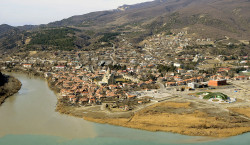Mtskheta
Mtskheta was founded in the 5th century BC. It was capital of the early Georgian Kingdom of Iberia (Kartli) from the 3rd century BC to the 5th century AD. It was a site of early Christian activity, and the location where Christianity was proclaimed the state religion of Kartli in 337. It remains the headquarters of the Georgian Orthodox Church.
King Dachi I Ujarmeli (early 6th century AD), who was the successor of Vakhtang I Gorgasali, moved the capital from Mtskheta to the more easily defensible Tbilisi according to the will left by his father. However, Mtskheta continued to serve as the coronation and burial place for most kings of Georgia until the end of the kingdom in the 19th century.
The old city lies at the confluence of the rivers Mtkvari and Aragvi. The rare blend of cultural values had ruled in this part of the world since the Bronze Age until prosperous Christian era over the unique eclectic lifestyle creating the mood of the town which is as old as the history of Georgia. Mtskheta is the most religious city of Georgia as it has been the shrine of pagan idols since times immemorial and it is where Christianity in Georgia takes its origin.
In recognition of its role in the Georgian Christian history, Mtskheta was granted the status of a "Holy City" by Catholicos-Patriarch Ilia II of Georgia in accordance of the written testament of his 11th-century predecessor Melchizedek I of Georgia.



